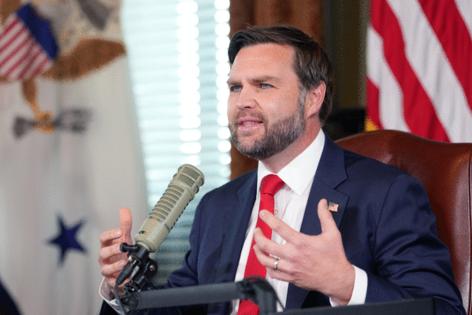Commentary: The right laughs off its own offenders and takes umbrage at the left's
Published in Op Eds
The phrase “kids will be kids” has long been used to excuse bad behavior. It grew out of a centuries-old idea that youth itself should confer some form of immunity — that immaturity, carelessness or even cruelty are simply part of growing up. What began as a forgiving nod to childhood mischief has evolved into a cultural permission slip, a way to turn irresponsibility into inevitability. It is now used to dismiss the harmful choices of adults as the natural impulses of children. “Kids will be kids.”
This indulgent logic now echoes through the politics of MAGA. When Republican figures or their allies say or do something offensive, it’s brushed off as a prank, a joke or “young people being stupid.” But when Democrats or their allies run afoul of cultural sensibilities, it is treated as evidence of moral decay. Critics on the right want swift action against violators on the left; they demand accountability. This is not a code of ethics. It’s a code of exceptions that doubles as a governing philosophy.
One damning recent example comes from a Politico report on a leaked group chat of young Republicans trading racist epithets, celebrating sexual assault and making antisemitic jokes about gas chambers and loving Hitler. In a time of heightened political polarization, these messages demonstrate how certain factions of the Republican Party can so blithely dehumanize their perceived political opponents. Initially, party leaders denounced the messages, identifying them as hateful and bigoted and calling for broad condemnation. Members of the group chat, ranging in age from 24 to 35, faced real consequences, with some even losing their jobs. Within little more than a day, however, the new default position was to dismiss the racist and violent rhetoric of this group chat as the youthful indiscretions of kids.
Speaking on “The Charlie Kirk Show,” Vice President JD Vance offered a forceful defense of the participants, arguing that “the reality is that kids do stupid things, especially young boys — they tell edgy, offensive jokes. That’s what kids do.” He continued, “I really don’t want us to grow up in a country where a kid telling a stupid joke, telling a very offensive, stupid joke is cause to ruin their lives.” Vance went on to characterize the public outcry as “ pearl-clutching” and admonished critics to “grow up.” Framing the group chat as a lapse in judgment rather than a reflection of character, the vice president urged listeners to “focus on the real issues” instead of “what kids say in group chats.”
Contrast this dismissive framing with how Vance responded to offensive comments in the wake of the Charlie Kirk assassination. Vance did not offer the indulgent “kids will be kids” line, instead urging Americans to treat any expression of glee over the death or support for the killer as a reportable offense. “When you see someone celebrating Charlie’s murder, call them out,” he said, adding, “and hell, call their employer.” When the offenders were critical of the right, the vice president decidedly did not treat their comments as youthful indiscretions. Instead, they were potentially career-ending scandals.
The double standard is not limited to Vance and people who joked about Kirk’s killing. More recently, Republicans have directed their outrage at Jay Jones, a former Virginia delegate and Democratic candidate for attorney general. Jones, once seen as a rising star in the party and a voice for generational change, became the center of a political firestorm after the release of private text messages he sent in 2022. In those messages, he fantasized about violence against a prominent Republican leader — remarks that were immediately condemned across the political spectrum. Republican officials, led by House Speaker Mike Johnson of Louisiana, called the comments “unforgivable” and “disqualifying,” demanding that Jones end his campaign. The swiftness and severity of their response stood in stark contrast to their indulgent defense of bigotry and cruelty among their own ranks, such as when the State Department hired Darren Beattie, a controversial former speech writer to be the undersecretary for public diplomacy and public affairs, or when Vice President Vance defended a DOGE staffer after his history of racist tweets was uncovered.
It would be bad enough if the Republican double standard on cruelty extended only to rhetoric and personal behavior, but it is also a window into how they wield power— for instance, targeting Democratic cities for federal crackdowns and trying to cause pain in Democratic areas during the government shutdown.
The “kids will be kids” moniker once described the harmless mistakes of youth. In the hands of Vance and other Republicans, however, it has become an excuse for bigotry, cruelty and impunity. The same people who demand mercy for themselves insist on mercilessness for everyone else. They describe their own abuses as jokes and their adult choices as childhood antics. It signals to supporters that loyalty excuses everything, and to critics that any slip invites personal and professional retribution. Ultimately, the danger of “kids will be kids” politics is not that it excuses childishness — it’s that it allows the childish to rule.
____
Marcus Bell is an associate professor of sociology and criminology at SUNY Cortland.
©2025 Los Angeles Times. Visit at latimes.com. Distributed by Tribune Content Agency, LLC.
























































Comments